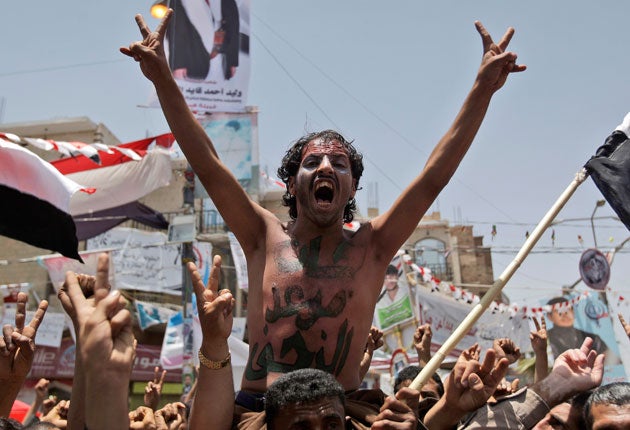Yemeni protesters killed as Saleh's troops storm their camp with tanks

Your support helps us to tell the story
From reproductive rights to climate change to Big Tech, The Independent is on the ground when the story is developing. Whether it's investigating the financials of Elon Musk's pro-Trump PAC or producing our latest documentary, 'The A Word', which shines a light on the American women fighting for reproductive rights, we know how important it is to parse out the facts from the messaging.
At such a critical moment in US history, we need reporters on the ground. Your donation allows us to keep sending journalists to speak to both sides of the story.
The Independent is trusted by Americans across the entire political spectrum. And unlike many other quality news outlets, we choose not to lock Americans out of our reporting and analysis with paywalls. We believe quality journalism should be available to everyone, paid for by those who can afford it.
Your support makes all the difference.Yemen's security forces stormed an anti-regime protest camp in the southern city of Taiz yesterday, killing at least 20 people in the second bloodiest day of the four-month uprising against President Ali Abdullah Saleh's rule.
The raid coincided with the bombing of a southern provincial town that had fallen to Islamist militants, bolstering the embattled president's claim that al-Qa'ida is poised to exploit the vacuum that his departure would leave.
On Sunday night, security forces moved in on the protesters' camp in Taiz's Freedom Square, focal point for anti-government demonstrations, deploying water cannons and tear gas.
Tanks and bulldozers then razed tents, setting them alight, eyewitnesses said. Soldiers also knocked down a field hospital and seized a nearby hotel, snipers using the rooftops to fire on the demonstrators.
Protesters described horrific scenes, with one claiming he had seen a tent ablaze with its terrified occupants inside unable to escape. Boushra al-Maqtari, one of the organisers of the protests, called it a "massacre", saying the many wounded had been dragged off to detention centres. Others claimed police had removed several of the dead bodies, suggesting the actual death toll could be much higher.
The brutal assault comes just days after the capital, Sanaa, erupted in ferocious street clashes after efforts by Saudi Arabia and other Gulf states to oversee the resignation of Mr Saleh collapsed. Five days of street battles ensued, killing 124 people.
Since protests first broke out in late January, Mr Saleh has generally refrained from the all-out violence against protesters seen elsewhere in the Middle East. Nevertheless, some 50 protesters were killed by snipers on 18 March in Sanaa, prompting a spate of defections among Mr Saleh's allies.
Mr Saleh has reneged on promises to step down, presenting himself as the only leader able to stop Yemen from falling into the hands of al-Qa'ida. Yesterday Yemeni fighter jets pounded the coastal town of Zinjibar, seized by Islamist militants a few days ago, in a bid to retake control. Ground forces also battled with the militants and at least six soldiers were killed by rocket-propelled grenades and an ambush on a convoy.
Different opposition groups have accused Mr Saleh of deliberately allowing the town to fall to Islamist militants, allowing him to use the spectre of the al-Qa'ida threat to cling on to power. Since a daring jail break by militants five years ago, al-Qa'ida in the Arab Peninsula (AQAP) has flourished in the lawless hinterlands of southern and eastern Yemen, and has been identified by the US as the single biggest threat to its domestic security.
It remained unclear if the militants were part of AQAP, with local residents saying the militants called themselves Ansar al-Sharia. Yemen scholar Gregory Johnsen tweeted that AQAP had taken to calling itself by that name, although Yemen-based al-Qa'ida experts said it was unlikely that AQAP would seize a town, thus presenting itself as a large target for air strikes.
Mr Saleh has attracted billions of dollars in US aid in his efforts to fight AQAP, and initially Washington refrained from criticising him, seeing him as a critical ally in the fight against global terrorism. But in recent weeks, the Obama administration has dropped its support for the Yemeni leader, instead backing efforts to secure his resignation in return for immunity.
Yesterday, Yemeni forces were also searching for three French aid workers who went missing in the desert province of Hawdramut at the weekend. It has not been confirmed if they were kidnapped, but the French foreign ministry said it was looking more likely after their car was found yesterday.
Join our commenting forum
Join thought-provoking conversations, follow other Independent readers and see their replies
Comments